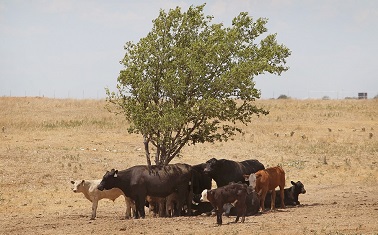
Economists estimate that Texas’ continuing drought has cost farmers up to $8 billion so far. [ScottOlsson/Getty]
The report released this week by a group of prominent and politically diverse business leaders and public officials stood out, in part, because of the alarming losses it forecasts for America’s agricultural industry.
This matters to all of us, because commodity agriculture is big business in the United States, putting food on our plates every single day.
 This September, a new crop will be made available to rice producers: carbon offsets.
This September, a new crop will be made available to rice producers: carbon offsets. Fertilizer use is key to increasing the productivity necessary for farms to feed rising populations. However, not using the right amount in the right place at the right time is one of the biggest threats to a stable climate. Nitrogen fertilizer not used by crops emits nitrous oxide, a heat-trapping gas 300 times more powerful than carbon dioxide. It also contaminates water supplies, causes algae blooms downstream and erodes soil health.
Fertilizer use is key to increasing the productivity necessary for farms to feed rising populations. However, not using the right amount in the right place at the right time is one of the biggest threats to a stable climate. Nitrogen fertilizer not used by crops emits nitrous oxide, a heat-trapping gas 300 times more powerful than carbon dioxide. It also contaminates water supplies, causes algae blooms downstream and erodes soil health.